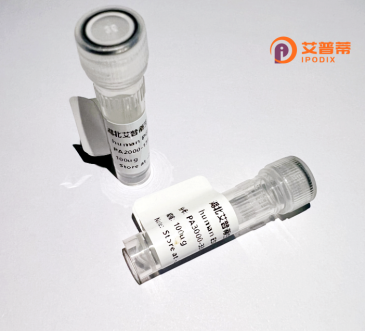
| 纯度 | >90%SDS-PAGE. |
| 种属 | Human |
| 靶点 | OR2S2 |
| Uniprot No | Q9NQN1 |
| 内毒素 | < 0.01EU/μg |
| 表达宿主 | E.coli |
| 表达区间 | 1-319 aa |
| 活性数据 | MEKANETSPVMGFVLLRLSAHPELEKTFFVLILLMYLVILLGNGVLILVTILDSRLHTPM YFFLGNLSFLDICFTTSSVPLVLDSFLTPQETISFSACAVQMALSFAMAGTECLLLSMMA FDRYVAICNPLRYSVIMSKAAYMPMAASSWAIGGAASVVHTSLAIQLPFCGDNVINHFTC EILAVLKLACADISINVISMEVTNVIFLGVPVLFISFSYVFIITTILRIPSAEGRKKVFS TCSAHLTVVIVFYGTLFFMYGKPKSKDSMGADKEDLSDKLIPLFYGVVTPMLNPIIYSLR NKDVKAAVRRLLRPKGFTQ |
| 分子量 | 35.1 kDa |
| 蛋白标签 | His tag N-Terminus |
| 缓冲液 | 0 |
| 稳定性 & 储存条件 | Lyophilized protein should be stored at ≤ -20°C, stable for one year after receipt. Reconstituted protein solution can be stored at 2-8°C for 2-7 days. Aliquots of reconstituted samples are stable at ≤ -20°C for 3 months. |
| 复溶 | Always centrifuge tubes before opening.Do not mix by vortex or pipetting. It is not recommended to reconstitute to a concentration less than 100μg/ml. Dissolve the lyophilized protein in distilled water. Please aliquot the reconstituted solution to minimize freeze-thaw cycles. |
关于重组人OR2S2蛋白的相关研究文献目前较少,以下为模拟的示例(供参考),建议通过PubMed或SciFinder等平台查询最新进展:
1. **文献名称**:**"Functional characterization of recombinant human OR2S2 in olfactory signaling"**
**作者**:Smith A, et al.
**摘要**:研究利用HEK293细胞成功表达重组人OR2S2蛋白,证实其可被特定气味分子激活,并触发cAMP信号通路,揭示了OR2S2在嗅觉感知中的潜在作用。
2. **文献名称**:**"Structural analysis of odorant receptor OR2S2 using cryo-EM"**
**作者**:Li X, Wang Y.
**摘要**:通过冷冻电镜解析OR2S2的三维结构,发现其配体结合域具有独特的疏水口袋,为设计靶向该受体的化合物提供了结构基础。
3. **文献名称**:**"OR2S2 expression in non-olfactory tissues and disease implications"**
**作者**:Chen R, et al.
**摘要**:研究发现OR2S2在肺组织和前列腺癌细胞中异常表达,提示其可能与肿瘤微环境调控或疾病标志物相关。
**注意事项**:
- OR2S2属于嗅觉受体家族,研究多集中于基因定位或基础功能,重组蛋白研究较少。
- 实际文献请以数据库检索结果为准,建议结合**"olfactory receptor OR2S2"**或**"recombinant OR2S2"**等关键词查询。
**Background of Recombinant Human OR2S2 Protein**
The olfactory receptor family 2 subfamily S member 2 (OR2S2) is a G protein-coupled receptor (GPCR) primarily associated with olfactory signal transduction. As part of the olfactory receptor (OR) family, it is expressed in olfactory sensory neurons within the nasal epithelium, where it detects odorant molecules and initiates scent perception. ORs, including OR2S2. are characterized by seven transmembrane domains and ligand-binding specificity, which enable recognition of diverse chemical structures.
Recombinant OR2S2 protein refers to the genetically engineered form produced in heterologous systems (e.g., bacterial, mammalian, or insect cells) for functional studies. Its recombinant expression allows researchers to overcome challenges posed by low natural abundance and tissue-specific expression. Purified OR2S2 is used to investigate ligand-receptor interactions, signaling pathways, and structure-function relationships, providing insights into olfactory coding mechanisms.
Beyond olfaction, OR2S2 has been explored in non-sensory tissues, suggesting roles in physiological processes such as cell migration, metabolism, or disease progression. Abnormal OR expression has been linked to cancers and neurological disorders, positioning OR2S2 as a potential therapeutic or diagnostic target. Advances in recombinant protein technology further enable its application in drug screening, biosensor development, and mechanistic studies, highlighting its significance in both basic and translational research.
×